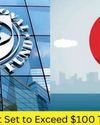
However, the situation changed when the war broke out between Russia and Ukraine, leading the US and its allies to prohibit Russia from exporting crude at a price exceeding US$60 per barrel. The intention behind setting a price cap was to prevent Russia from utilizing export earnings, including dollars and other hard currencies, to finance the war against Ukraine. India was eager to take advantage of this opportunity to purchase crude at a lower price, given that the global crude prices ranged from $110 to $123 per barrel, and the war posed a threat to supply chains. Additionally, there were efforts to restrict foreign exchange reserves held in dollars.
As a further measure, payments to Russia were banned from the Society for Worldwide Interbank Financial Telecommunication (SWIFT) system. Since most international payment settlements rely on SWIFT, conducting business with Russia became exceedingly challenging. Nevertheless, alternative methods were employed successfully, such as utilizing third parties for customary payments involved in global commodity trading, where specialized trading houses facilitated trade between countries. Unlike the punitive measures taken against Iran, these efforts were less severe. The current situation does not pose such a dire threat.
Esta historia es de la edición June 1 - 30, 2023 de BUSINESS ECONOMICS.
Comience su prueba gratuita de Magzter GOLD de 7 días para acceder a miles de historias premium seleccionadas y a más de 9,000 revistas y periódicos.
Ya eres suscriptor ? Conectar
Esta historia es de la edición June 1 - 30, 2023 de BUSINESS ECONOMICS.
Comience su prueba gratuita de Magzter GOLD de 7 días para acceder a miles de historias premium seleccionadas y a más de 9,000 revistas y periódicos.
Ya eres suscriptor? Conectar

Bank of Baroda, Kolkata Zone organised Mega Kisan Melas in West Bengal
Bank of Baroda (BOB) organised Mega Kisan Mela at Konkalitala in Birbhum District of West Bengal on November 18, 2024 as a part of the 7th Edition of the Baroda Kisan Pakhwada (BKP).

Time-Bound Disposal of Cases to Expedite the Delivery of Justice and affordabe by all in India
The delay in the disposal of cases in Indian courts remains a significant hurdle to the nation's progress.

Dev Deepawali: A grand celebration of light, spirituality, and culture in Varanasi
The holy city of Varanasi, often regarded as India's spiritual and cultural heart, came alive with the splendor of Dev Deepawali on the sacred day of Kartik Purnima.

The life of Job 'Ye judge not the judgment of God' - Jesus Christ
The Holy Bible reveals through the life of Job how the Lord tests the righteous and that faith helps one to overcome life's adversities.

India has the highest potential for the garment industry, only a conducive government policy is required.
India's textile industry is poised for remarkable growth, with expectations to double its contribution to the GDP within the next six to seven years.

Global Public Debt may be worse than it appears, warns IMF
Global Public Debt Set to Exceed $100 Trillion, Warns IMF

The economic consequences of Trump's Presidency: A global perspective
One of the key economic factors contributing to the Democrats' loss in the US elections was the significant rise in inflation, which was initially triggered by the COVID-19 pandemic and exacerbated by the Russia-Ukraine war.

Challenges and Successes in West Bengal's Education Sector: A Comprehensive Overview
The education system in West Bengal, particularly in districts, villages, slums, and government institutions, reflects a blend of progress and ongoing challenges.

What India can expect from Trump's return
I may be too early to predict how Donald Trump's second term as president will impact the global oil market.

Stocks Surge Following Donald Trump's Election as 47th President of the USA
Stocks soared following the election of Donald Trump as the 47th President of the United States. Investors anticipated that the Information Technology (IT) sector would benefit from lower corporate taxes under the Republican regime, with IT stocks leading the rally.